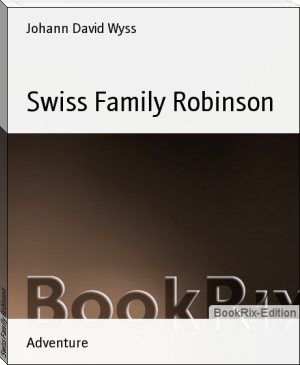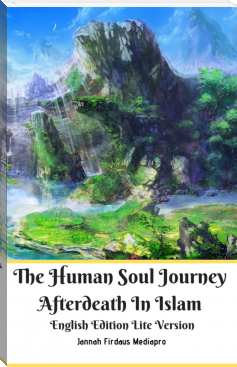Swiss Family Robinson - Johann David Wyss (poetry books to read txt) 📗

- Author: Johann David Wyss
- Performer: -
Book online «Swiss Family Robinson - Johann David Wyss (poetry books to read txt) 📗». Author Johann David Wyss
interest in watching the little ants of your native country, how
delighted and astonished you would be to see the wonders performed by
the vast tribes of large ants in foreign lands.
`Some of these build heaps or nests, four or six feet high and
proportionately broad, which are so strong and firm that they defy
equally sunshine and rain. They are, within, divided into regular
streets, galleries, vaults, and nurseries. So firmly are these mounds
built, that with interior alterations, a deserted one might be used for
a baking-oven.
`The ant, although respected since the days of King Solomon as a model
of industry, is not in itself an attractive insect.
`It exudes a sticky moisture, its smell is unpleasant, and it destroys
and devours whatever eatable comes in its way. Although in our own
country it does little harm, the large ants of foreign lands are most
destructive and troublesome; it being very difficult to check their
depredations. Fortunately they have enemies by whose exertions their
numbers are kept down; birds, other insects, and even four-footed
beasts prey upon them.
`Chief among the latter is the ant-eater, or tamanoir, of South
America, a large creature six or seven feet in length, covered with
long coarse hair, drooping like a heavy plume over the hind quarters.
The head is wonderfully elongated and very narrow; it is destitute of
teeth, and the tongue resembles somewhat a large great red earthworm.
It has immensely strong curved claws, with which it tears and breaks
down and scratches to pieces the hard walls of the ant-heaps; then,
protruding its sticky tongue, it coils and twists it about among the
terrified millions disturbed by its attack; they adhere to this
horrible invader, and are drawn irresistibly backward into the hungry,
toothless jaws awaiting them.
`The little ant-eater is not more than about twenty-one inches in
length, has a shorter and more natural looking head, and fine silky
fur. It usually lives in trees.’
I was pleased to find my memory served me so well on this subject, as
it interested my boy amazingly; and occupied us for a considerable time
while we traveled onward.
Arriving presently at a grove of tall trees, with very strong, broad,
thick leaves, we paused to examine them; they bore a round fig-like
fruit, full of little seeds and of a sour harsh taste.
Fritz saw some gummy resin exuding from cracks in the bark, and it
reminded him of the boyish delight afforded by collecting gum from
cherry-trees at home, so that he must needs stop to scrape off as much
as he could. He rejoined me presently, attempting to soften what he had
collected in his hands; but finding it would not work like gum, he was
about to fling it away, when he suddenly found that he could stretch
it, and that it sprang back to its original size.
`Oh father, only look! This gum is quite elastic! Can it possibly be
india-rubber?’
`What!’ cried I, `Let me see it! A valuable discovery that would be,
indeed; and I do believe you are perfectly right!’
`Why would it be so very valuable, father?’ inquired Fritz. `I have
only seen it used for rubbing out pencil marks.’
`India-rubber,’ I replied, `or, more properly, caoutchouc, is a milky
resinous juice which flows from certain trees in considerable
quantities when the stem is purposely tapped.
`These trees are indigenous to the South American countries of Brazil,
Guiana, and Cayenne. The natives, who first obtained it, used it to
form bottles by smearing earthen flasks with repeated coatings of the
gum when just fresh from the trees, and when hardened and sufficiently
thick, they broke the mold, shook out the fragments, and hung the
bottles in the smoke, when they became firmer, and of a dark color.
`While moist, the savages were in the habit of drawing rude figures and
lines on the resin by way of adornment; these marks you may have
observed, for the bottles obtained from the natives by the Spaniards
and Portuguese have for years been brought to Europe, and cut into
portions to be sold for use in drawing. Caoutchouc can be put to many
uses, and I am delighted to have it here, as we shall, I hope, be able
to make it into different forms; first and foremost, I shall try to
manufacture boots and shoes.’
Soon after making this discovery, we reached the cocoanut wood, and saw
the bay extending before us, and the great promontory we called Cape
Disappointment, which hitherto had always bounded our excursions. In
passing through the wood, I remarked a smaller sort of palm, which,
among its grand companions, I had not previously noticed. One of these
had been broken by the wind, and I saw that the pith had a peculiar
mealy appearance, and I felt convinced that this was the world-renowned
sago-palm.
In the pith I saw some fat worms or maggots, and suddenly recollected
that I had heard of them before as feeding on the sago, and that in the
West Indies they are eaten as a delicacy.
I felt inclined to try what they tasted like; so at once kindling a
fire, and placing some half dozen, sprinkled with salt, on a little
wooden spit, I set them to roast.
Very soon rich fat began to drop from them, and they smelt so
temptingly good, that all repugnance to the idea of eating worms
vanished; and, putting one like a pat of butter on a baked potato, I
boldly swallowed it, and liked it so much, that several others followed
in the same way. Fritz also summoned courage to partake of this novel
food; which was a savoury addition to our dinner of baked potatoes.
Being once more ready to start, we found so dense a thicket in the
direct route, that we turned aside without attempting to penetrate it,
and made our way towards the sugar-brake near Cape Disappointment. This
we could not pass without cutting a handsome bundle of sugarcanes, and
the donkey carried that, in addition to the bag of wax berries.
In time we reached the sledge in Calabash Wood: the ass was unloaded,
everything placed on the sledge, and our patient beast began calmly and
readily to drag the burden he had hitherto borne on his back.
No further adventure befell us, and we arrived in the evening at
Falconhurst, where our welcome was as warm as usual—all we had to
tell, listened to with the greatest interest, all we had to show, most
eagerly examined, the pretty green parakeet enchanting the boys most
particularly.
An excellent supper was ready for us, and with thankful hearts we
enjoyed it together; then, ascending to our tree-castle, and drawing up
the ladder after us, we betook ourselves to the repose well earned and
greatly needed after this fatiguing day.
The idea of candle-making seemed to have taken the fancy of all the
boys; and next morning they woke, one after the other, with the word
candle on their lips. When they were thoroughly roused they continued
to talk candles; all breakfast-time, candles were the subject of
conversation; and after breakfast they would hear of nothing else but
setting to work at once and making candles.
`So be it,’ said I, `let us become chandlers.’ I spoke confidently,
but, to tell the truth, I had in my own mind certain misgivings as to
the result of our experiment. In the first place, I knew that we lacked
a very important ingredient—animal fat, which is necessary to make
candles burn for any length of time with brilliancy. Besides this, I
rather doubted how far my memory would recall the various operations
necessary in the manufacture.
Of all this, however, I said nothing; and the boys, under my
direction, were soon at work. We first picked off the berries and
threw them into a large shallow iron vessel placed on the fire. The
green sweet-scented wax was rapidly melted, rising to the surface of
the juice yielded by the berries. This we skimmed off and placed in a
separate pot by the fire, ready for use, repeating the operation
several times, until we had collected sufficient liquid wax for our
purpose. I then took the wicks my wife had prepared, and dipped them
one after the other into the wax, handing them as I did so to Fritz,
who hung them up on a bush to dry.
The coating they thus obtained, was not very thick; but, by repeating
the operation several times, they at length assumed very fair
proportions, and became real sturdy candles. Our wax being at an end,
we hung these in a cool shady place to harden; and that same night we
sat up like civilized beings three whole hours after sunset, and
Falconhurst was for the first time brilliantly illuminated.
We were all delighted with the success of our experiment. `You are
indeed clever,’ said my wife, `I only wish that with your ingenuity you
would show me how to make butter. Day after day, I have the annoyance
of seeing a large supply of good cream go bad under my very eyes,
simply because I have no use to which to put it. Invent a plan, please
do.’
`I think that perhaps I can help you,’ I replied after a little
consideration, `not that I can claim the honour of the invention of my
plan, that is due to the Hottentots. I will see what I can do. Jack,
bring me one of our gourd bottles.’
I took the gourd, one of those I had previously prepared, with a small
hole at one end and well hollowed-out and cleaned; this I partially
filled with cream and then corked up the hole tightly.
`Here, boys,’ said I, `you can continue the operation while I turn
carpenter and make a cart to take the place of our sledge.’ I gave them
their directions, and then set about my own work.
They fixed four posts in the ground, and to them fastened a square
piece of sailcloth by four cords attached to the corners. In this
cradle they placed the gourd of cream, and each taking a side, rolled
it backwards and forwards continuously for half an hour.
`Now,’ I cried, looking up from my work, `open the gourd and take the
contents to your mother, with my compliments.’
They did so; and my good wife’s eyes were delighted with the sight of a
large lump of capital fresh butter.
With my son’s assistance the cart was in time completed; a clumsy
vehicle it was, but strong enough for any purpose to which we might put
it, and, as it proved, of immense use to us in collecting the harvest.
We then turned our attention to our fruit trees, which we had planted
in a plot ready for transplanting. The walnut, cherry, and chestnut
trees we arranged in parallel rows so as to form a shady avenue from
Falconhurst to Family-bridge; and between them we laid down a tolerable
road, that we might have no difficulty in reaching Tentholm, be the
weather bad as it might.
We planted the vines round the arched roots of our great mangrove, and
the rest of the trees in suitable spots; some near Falconhurst, and
others away over Jackal river, to adorn Tentholm. Tentholm had been the
subject of serious thoughts to me for some time past, and I now turned
all my attention thither. It was not my ambition to make it beautiful,
but to form of it a safe place of refuge in a case of emergency.
My first care, therefore, was to plant a thick prickly hedge, capable





Comments (0)